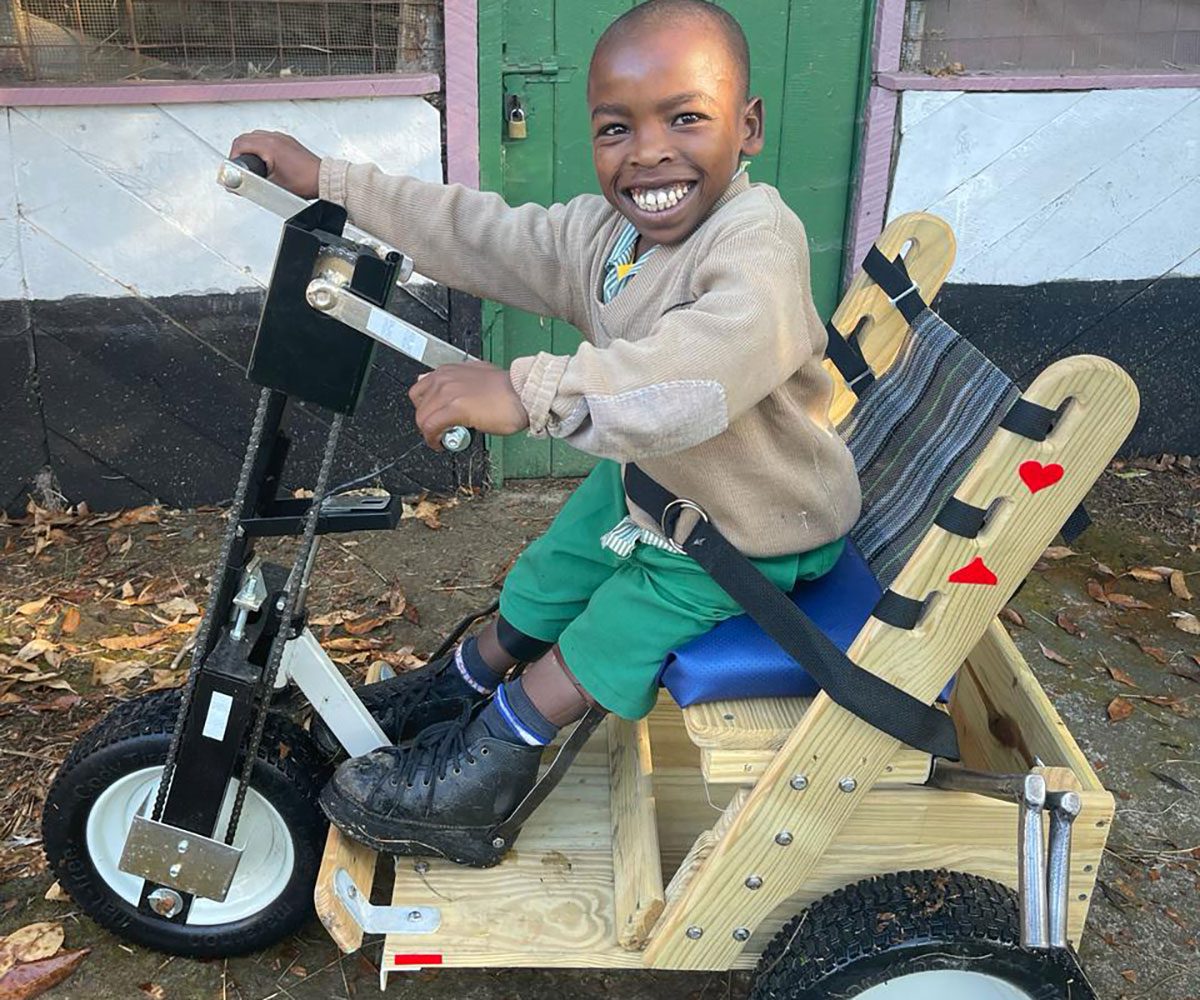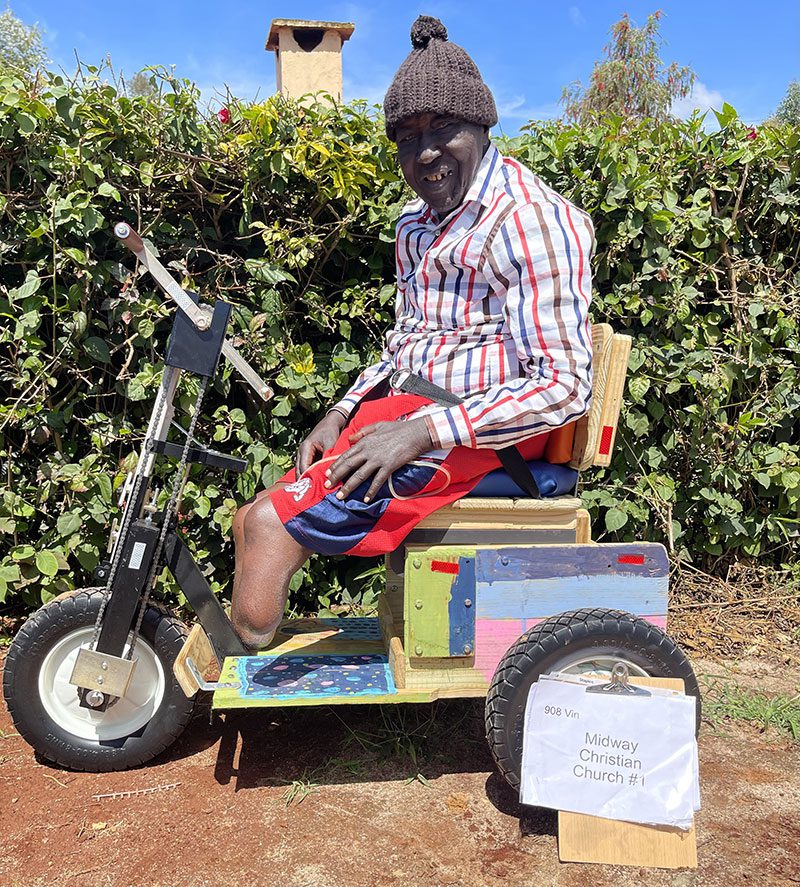“He will travel up to six miles every day in that cart”
From Raising Funds and Awareness: Craft Beer and Carts:
July 11, 2024

Among the hundreds of photos in the shop at Mobility Worldwide MO – Columbia, there’s a snapshot of a man with withered, lifeless legs. He’s sitting in a mobility cart, demonstrating the independence that the cart gives him.
“This is one of my favorites [photos] because he will travel up to six miles every day in that cart,” says Gary Moreau, executive director at Mobility Worldwide MO – Columbia.
Designed and built to go where wheelchairs can’t easily maneuver, mobility carts have helped thousands of individuals worldwide for thirty years now. Along with celebrating Mobility Worldwide MO-Columbia’s thirtieth anniversary, the organization is preparing for a July 14 fundraiser to increase its resources and visibility.
The Craft Beer and Carts fundraiser, organized by the Rotaract Club, is set for noon to 4 p.m. Sunday at the Columbia Farmers Market MU Health Care Pavilion. Tickets are $20 for adults, $10 for students, and kids under 10 will be admitted free. Sponsorships are also available and, along with tickets, will be sold at the entrance. The event includes opportunities to decorate a cart, live music from C. Rock City and Kenyan musicians, and food trucks from Lefty’s Kettle Corn, Zydeco’s Cajun, Gina’s Vegan a Go Go, and Mia Taco.
“Most people just don’t know about us,” Moreau adds, noting that Mobility Worldwide MO – Columbia had a record year in 2023, making and shipping 2,220 carts.
The nonprofit got its start in 1994 in a garage when Larry Hills, a missionary in Zaire (formerly the Democratic Republic of Congo) told Rev. Mel West about the need for three-wheeled, hand-cranked wheelchairs for victims of polio, landmines, and birth defects. Earl Miner, a long-time friend of West, became the product designer and mission partner and built the first mobility cart prototype. Within a year, four prototype carts were sent to Hills with the instructions, “Put these in the worst place you can find and see if they pass the test.” When the prototypes graduated from the testing phase, the carts earned the name Personal Energy Transportation (PET).
West, who just celebrated his 100th birthday in May, is a retired pastor, co-founder, and director emeritus of Mobility Worldwide MO-Columbia, and is still serving on the advisory council. It’s noteworthy that West launched the organization well into his retirement at the age of 70.
“This is a great place for retirees to work; to do something productive that they enjoy. They fell like it gives them a lot of meaning,” Morrow explains, adding, “We’re always looking for volunteers.”
The shop turns out forty to fifty carts each week, but Morrow hopes that number can increase to seventy to eighty carts per week.
The mobility carts are off-road, hand-cranked carts designed for people in developing countries. Mobility Worldwide promotes itself as a global, faith-based, non-profit, volunteer organization committed to ending immobility worldwide. But the organization does more than build carts. It also funds and partners with affiliates to recondition traditional mobility aids like canes, foldable walkers, crutches, and wheelchairs. Apart from mobility, the organization refurbishes sewing machines that are shipped along with carts and traditional mobility aids, allowing individuals to make their own clothing or sell clothing to earn a living.
The shipments are packaged with plastic milk jugs that are repurposed and used to hold clean drinking water.
Most carts from Mobility Worldwide go to Partners For Care in Kenya and Partners for Care sends photos and stories back to the sponsors who will donate and decorate a cart at the Craft Beer and Carts fundraiser. Kathy Maynard, AU and business administrator at Mobility Worldwide Columbia – MO, says those sponsors will receive a framed photo showing who received the decorated cart.
“It is a keepsake of the impact they were able to make, hopefully encouraging them to donate and come back again next year,” Maynard adds.
The mobility carts are made from recycled and donated items and then delivered to people in developing countries at no cost. Mobility Worldwide MO – Columbia is the original and only location that produces all three different carts: the small hand-cranked cart for children and those experiencing dwarfism, the large hand-cranked cart for adults, and the pull cart for individuals who are unable to use their arms or hands. Most of the organization’s other shops around the U.S. make only the large hand-cranked cart.
Since the carts are made with treated wood, the fundraiser allows the sponsors to paint them, adding a uniquely personalized and colorful touch. The organization’s new building in Columbia, which is an upgrade from the previous site, was finished in 2020.
“Gary has been the director for twelve years; I call him the Energizer Bunny,” Maynard says. “He’s picking up trash on the side of the road or helping out with his church.”
The “Energizer Bunny” tag also applies to West.
“They’re constantly helping out the city to make it a better place, and Mel manages to do it on a larger scale than Gary, reaching worldwide,” Maynard explains.
While the organization sends six to nine containers each year to Kenya — with between 150 to 200 carts in each container — Mobility Worldwide also assists the Aztec Ministry of Grace in Mexico, working in the highlands of central Mexico with the indigenous population struggling with diabetes.
“They have sent me pictures; their legs have been amputated because of diabetes. They have a huge need there,” Moreau explains. Diabetes can lead to peripheral arterial disease (PAD), which causes the blood vessels to narrow and reduces blood flow to the legs and feet. This can also cause nerve damage, also known as peripheral neuropathy, which can prevent someone from feeling wounds or ulcers on their legs or feet. The reduced blood flow can slow wound healing and make the body less effective at fighting infection. If infection reaches the bone and cannot be healed amputation may be necessary.
Success has not come without its hardships. Moreau says the organization recently lost $60,000 worth of carts and aid in a fire in Austin, Texas, when the truck delivering the carts to the port caught fire. The disaster meant canceling the shipment of 150 to 180 carts to overseas groups waiting for the carts.
“It was our biggest accident and loss,” he says.
But Worldwide Mobility MO – Columbia continues to thrive and persevere, and the fruits of its labor are evident and unmistakable judging by the photos that line the walls. The images are from cart recipients in Kenya, El Salvador, Sierra Leone, Mexico, and dozens of other locales. Gifts of gratitude, reflecting those cultures are also on display. The entryway is set up with models of the three styles of hand-cranked carts made at the location.
Mobility Worldwide MO–Columbia
4825 E Meyer Industrial Drive
Columbia, MO 65201 USA
(573) 886-7877
info@GiftofMobility.org

